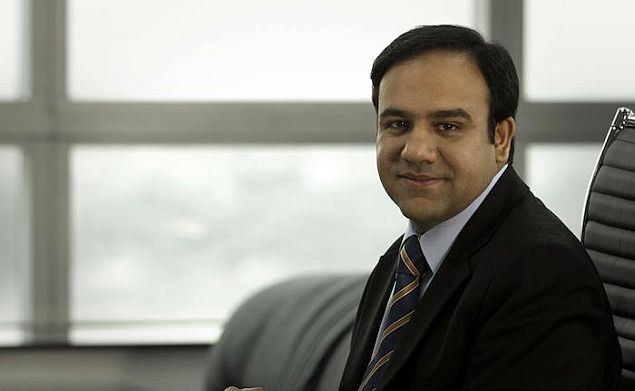I’m waiting for my interview with Dr Umar Saif, chairman of the Punjab Information Technology Board (PITB), outside his offices on the 11th floor of a glistening building in the heart of Lahore.
There is an air of nervous trepidation – it is my first time interviewing someone associated with the government, and the common stereotype suggests it will be difficult to have a relaxed and comfortable talk. While I am aware of Dr Saif’s credentials – he received his doctorate in computer science from Cambridge at the age of 22 and then taught at MIT before moving back to Pakistan – I am unsure of what to expect. I hope for the best.
As I am ushered into the office by his secretary, Dr Saif greets me with a firm handshake and indicates that I should take a seat and wait a few minutes longer. He has a beautiful, sprawling office with a mesmerizing view of the city and I take the opportunity to cater to my amateur photography hobby. Dr Saif remains hunkered down on his desk, typing away furiously on a computer and attending to calls.
After what seems like an eternity, but in reality is only about ten minutes, Dr Saif gets up from his chair and makes his way towards me. I am immediately caught off guard; there’s a smile on his face and he seems warm, welcoming, and jovial.
I try my usual tactic of asking a few ice-breaking questions to lighten the atmosphere and make the interviewee feel at ease. However, he is having none of it. Dr Saif is first interested in finding out more about myself. He wants to know where I went to college, my career trajectory so far, and my passions in life. I am taken aback – it is very rare for people to exhibit genuine interest. Most are obsessed with their own or their company’s publicity and leave no stone unturned to elaborate how they are the next big thing.
MIT and beyond
Frankly speaking, it wouldn’t have been much of an exaggeration if Dr Saif claimed that about himself. He is a perennial overachiever, finishing high school at 16, graduating from college at 19, and eventually completing his doctorate at an age when most are still struggling to understand which line of work to enter. At MIT, where he started his postdoc, he was part of Project Oxygen, a visionary project trying to fundamentally redesign the way mankind interacts with machines. Dr Saif’s work on the project focused on ubiquitous computing, building embedded operating systems for mobile platforms.
After several years teaching and researching at MIT, Dr Saif moved back to Pakistan. He tells me it was not an easy decision at all – up until that time he had been solely focused on an academic career and that requires a “certain type of lifestyle.” Nevertheless, it was a combination of his desire to assist his country of birth and pressing family commitments which resulted in the decision. This was in 2005.
Later that year, Dr Saif accepted a faculty position at his alma mater – the Lahore University of Management Sciences (LUMS). He was eager to replicate some of the things he had learned during his time at MIT and started working with some of his brightest students to develop scalable, innovative solutions. One of these was SMSall, a text message-based social network that he claims has sent billions of messages since it was first rolled out. Another was BitMate, a bittorrent client specifically engineered for people in countries with low bandwidth. As a result of his work, in 2011, the MIT Technology Review named him as one of their ‘World’s Top Young Innovators’ – the first Pakistani to be bestowed this honour.
Career pivot
Pakistan’s media was quick to catch on to these exploits. As a result of the coverage, Dr Saif received a call from a senior government minister, inviting him to breakfast. At the meeting, he was offered the opportunity to lead PITB. “I thought this was an opportunity to help make a difference – I had obtained a sabbatical from LUMS and thought three or four months would not matter much. Now, it is been four years,” he smiles.
PITB is now recognised as an institution at the forefront of using technology to solve social problems. Its work has permeated into almost all sectors of service delivery, including education, healthcare, and rescue services. Amongst other things, the Punjab government has digitized school textbooks, used technology to identify and correct public health outbreaks, and introduced a number of e-government services, allowing citizens to interact with the state far more efficiently. He tells me he is a fan of “using big data to solve problems,” and that their approach is proactive rather than reactive. “We are constantly sniffing out problems and trying to solve them,” he adds.
People like me, we do not usually work for the government. There is not a lot of money. But the impact that we are having is incredible – the velocity is amazing. Public sectors such as education and healthcare are much better now than in the past.
Pakistan’s most successful incubator and accelerator, Plan9 and PlanX, were also Dr Saif’s babies. They rank as one of the most meaningful contributions he’s made to encourage the growth of the tech start-up ecosystem in the country. He tells me the decision to start these incubators grew out of his personal pain and struggle when trying to build a company. “Little things such as office space, networking with mentors, and development of business skills are aspects that entrepreneurs should take for granted. Unfortunately, in Pakistan, they were few and far between.”
However, it was not so easy to convince others. Many in tech circles were sceptical about its true goal – the fact that the incubator was funded by the government and spearheaded by a technocrat served as a dampener. There were accusations that the government might eventually usurp the companies incubated or that any future success would be drummed up for political mileage. Nevertheless, work on building Plan9 forged ahead.
When I say Plan9 and PlanX start-ups have been successful, I’m looking at them purely from a fundraising angle. The overwhelming majority of reported seed-stage investments in Pakistani start-ups this year have been from those housed in the incubator. One of their earliest start-ups, Markhor, also became the first Pakistani company to be accepted at Y Combinator – not an easy feat for any young team.
Building the tech ecosystem
I try to press Dr Saif about why he thinks Plan9 has taken off the way it has so far. But he is reluctant to take any credit, or even call it a success. He explains that the mushroom growth of incubators and accelerators emanating from the private sector is a better metric of success and one that will ensure longevity of the ecosystem. “That’s what governments do. They trigger, they catalyse, and then the private sector takes over,” he opines.
One message that Dr Saif consistently drives home during the interview is how they are trying to be as transparent as possible. He reveals he works with PITB on a completely pro-bono basis, refusing to take a salary. No one sitting on the board of directors for Plan9 and PlanX are allowed to take equity in the start-ups until they graduate – a decision which has led to some of them resigning in protest. Dr Saif’s own ventures have been denied office space at the Arfa Karim Software Technology Park lest someone accuse him of using his influence for personal gain.
So when will we see a billion-dollar start-up from Pakistan? Dr Saif remains supremely confident that the time is not too far away. He says: “There’s no dearth of talent or passion in Pakistan. If you see the start-ups that have graduated from our incubators, about fifteen of them are doing fantastically well. One or two of them could very well go on to make it huge.”
There is an air of surprising resignation when I ask him about the future of both Plan9 and PlanX. “Obviously, we’ll go away,” he says. “Governments are governments, if a new one comes in and their priorities are not aligned, [this project] could go away. They could fire me.”
On a personal level, Dr Saif might be bracing to resume his academic career and move away from the hybrid-technocrat position he currently occupies. He frankly admits he is not certain whether he will continue as the chairman of PITB for the foreseeable future. Numerous references to his other role as the vice-chairman of Information Technology University suggest he could be ready to delve into that on a full-time basis. A driving force might be his desire to develop technologies for the future – he tells me a lot of money has been pumped in to spruce up its R&D wing as well as hire faculty who will help breed the next generation of entrepreneurs.
Whatever happens next, it is clear that there is already been a systemic shift in the way most of Pakistan views tech. The majority of Dr Saif’s initiatives have been restricted to the largest province, Punjab, but the projects he has built and set in motion are known across the country. Slowly, other provinces are catching up and asking for assistance in strengthening their own tech departments. “PITB has become more of a national institution, and that’s a good thing,” he smiles.
This article was originally published on Tech In Asia.






